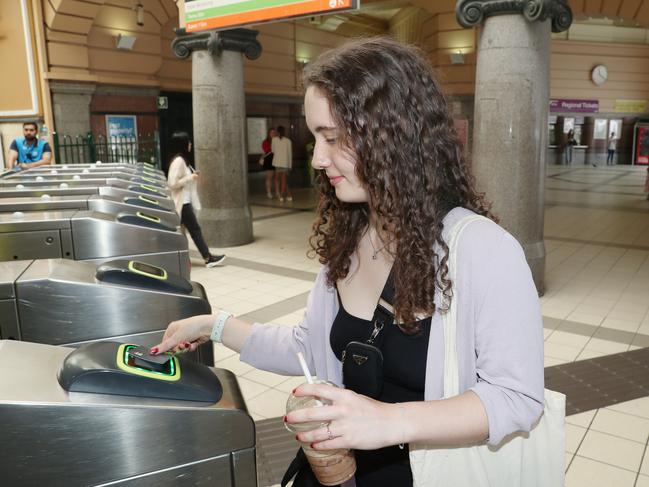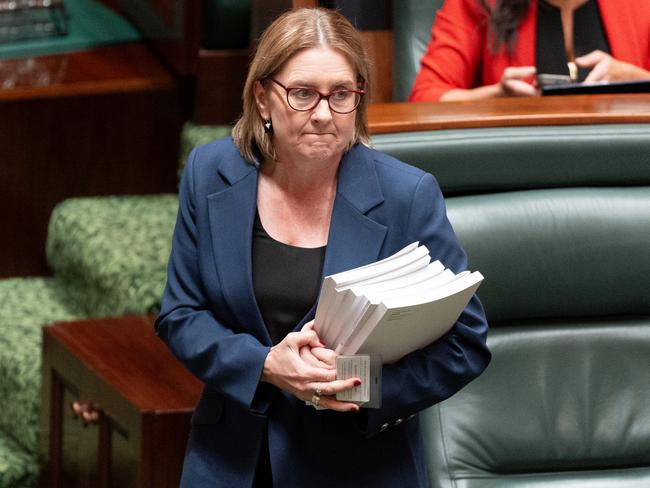Myki credit card tap-on delay headlines $3.3 billion in major project blowouts
Victoria’s bid to install a basic feature of any modern transport system has suffered a $137m blowout and is running up to 18 months behind schedule.
Victoria
Don't miss out on the headlines from Victoria. Followed categories will be added to My News.
An upgrade of the troubled myki system to allow for credit card tap-ons across the transport network will cost an extra $137 million and is running 18 months late.
The new financial hit is among $3.3 billion in major project blowouts that have battered the state budget in the past year — a total increase of about 2 per cent for the projects impacted.
Delays of three months or more have also hit almost a third of projects across the state, as broader construction sector woes continued to hit the Big Build.
The taxpayer pain comes as the Allan Government taps the brakes on its Big Build, which is spread across 518 public sector roads and rail, schools, and hospitals, to create a more “sustainable infrastructure program”.
Some of the budget blowouts include $838m on the Metro Tunnel announced last year, more than $410m on regional rail upgrades, $53m on the troubled Murray Basin Rail Project, and $40m on the Tarneit railway station in Melbourne’s west.
Most of the blowouts are blamed on market forces, with construction costs soaring over recent years.
But the $137m blowout on the myki upgrade was due to a “program reset”, which was forced after contractor Conduent complained of unforeseen costs.
This included being unable to access source code and other technical information from the previous operator.

Budget papers show the full project is not due to finish until the end of 2028, after being due to wrap up halfway through 2027.
Despite this, the government has committed to having credit cards in use for full fare passengers on some modes of transport early next year, after it announced it would do a staged rollout.
The Herald Sun revealed the project had been thrown into turmoil this year when one of the project partners walked away from the job, following a legal dispute over costs.
The budget papers suggest the worst of the material price hikes sparked by Covid-19 and global chaos are behind us, but that risks of skills shortages remain.
After annual infrastructure spending hit an unprecedented $24bn a year, capital investments are set to slow to $16bn a year by 2028-29, under what Treasurer Jaclyn Symes calls a “commitment to a sustainable infrastructure program”.
An extra $8.1bn in new projects have been jammed into the pipeline this year, however, ensuring job numbers don’t dry up overnight.
This includes the previously announced spending on the Sunshine station expansion and untangling of rail lines in the west, which the Allan Government says paves the way to build an Airport Rail Link.
It also includes $1.2bn in schools and education, and $214m on hospitals.

As Victoria’s infrastructure spending slows – albeit to a level that is still higher than prior to the Covid-19 crisis – budget papers also show a significant proportion of spending over the next decade will be on the $34.5 billion Suburban Rail Loop East.
The Government now calls the first stage of a 90km orbital rail line “Australia’s biggest housing project” due to plans to build 70,000 new homes around station precincts, including in suburban high rises.
The State hopes to secure $11.5bn from the Commonwealth to help pay for the 26km tunnel between Cheltenham and Box Hill, which will be dug from next year and open to passengers in 2035.
So far, the Albanese Government has provided $2.2bn, but has baulked at further cash injections until issues with a project business case – raised by its advisory body Infrastructure Australia – have been addressed.
State Budget papers take a dig at the Commonwealth for historically underfunding Victorian infrastructure, as a share of population.
This includes this year’s federal budget, which provides Victoria a 21.4 per cent share of national rail and road funding despite the state housing 25.8 per cent of the country’s population.
“Funding received from the Commonwealth is also often not aligned with project milestones, meaning the State is providing upfront cashflows for jointly funded major projects,” the Budget says.
It says a co-ordinated effort by the Commonwealth and State is needed to better deliver infrastructure in the national interest including “investment in the city-shaping Suburban Rail Loop, a crucial transport link and Australia’s biggest housing project in its most populous city”.



